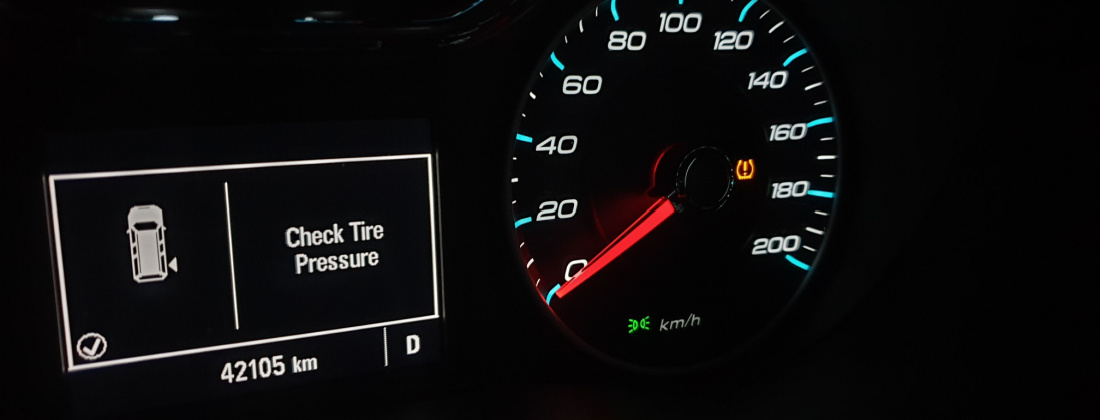
Did you know that your tires wear out faster if the appropriate pressure is not maintained? Your tires are more important than you realize. As brakes and tires are the cornerstones of your vehicle’s safety, they properly absorb shocks and follow the steering directions better when the correct tire pressure is maintained. A tire pressure monitoring system is important to ensure that your tires are at optimum pressure.
A TPMS, or tire pressure monitoring system, is used to keep track of the current air pressure in the tires on your vehicle. It will alert the driver on the web, a mobile platform or as an indication on the car’s dashboard. The tire pressure monitoring system sensor’s job is to warn the driver of any potential safety issues that might be brought on by insufficient tire pressure.
A TPMS consists of sensors, often located inside the tire, that transmit data to one or more modules inside the car. These modules can be pre-programmed with that information to notify you if one or more of your tires deviate from the prescribed tire pressure range.
When one or more of your tires have low pressure (25 percent below the recommended psi), a TPMS light will turn on. Check your tires immediately and take care of the problem if the light is still on. To check your tire pressure, use a manual gauge, locate a gas station, or head to the closest technician for prompt repair.
The TPMS has many sensors, each with a particular functioning model. Now let’s explore the numerous tire pressure monitoring system sensor categories.
There are different types of Tire Pressure monitoring systems, as follows:
The most straightforward and popular technique of tire pressure monitoring is direct TPMS. A separate sensor is attached to each tire, immediately informing the driver of tire pressure. The sensor alerts the driver if the air in the tires needs to be increased or decreased or if they need to be replaced.
Sensors in a direct TPMS may even provide tire temperature measurements. All of this data is delivered by the direct tire pressure monitoring system to a centralized control module, where it is analyzed, translated, and, if the tire pressure is lower than it should be, sent straight to your dashboard, where the indicator light turns on.
This information is often wirelessly sent by a direct tire pressure monitor. Every sensor has its own serial number. This is how the system distinguishes between pressure measurements for each particular tire and between itself and systems on other cars.
The most common type of TPMS in non-luxury automobiles is indirect TPMS. When a tire loses pressure, it can offer a driver a simple alarm.
Indirect TPMS compares the rotational speed of one tire to the others using the vehicle’s Anti-Lock Braking System (ABS) wheel speed sensors. The car’s onboard computer will get a warning if a tire is low on pressure because it will roll at a different amount of rotations per mile than the other three.
When all four tires are losing pressure at the same pace, which can happen due to the effects of time and temperature, indirect systems cannot produce reliable readings and may fail to warn you.
Using a Tire Pressure Monitoring System in your vehicle provides you with numerous benefits:
Under-inflated tires have more rolling resistance, which can have a negative effect on your fuel economy. Keeping your tires filled to the proper air pressure can increase your car’s mileage by up to 3%.
TPMS notifies you when your vehicle’s tire pressure is low or is going flat. By helping you maintain proper tire pressure, TPMS can improve your safety on the road by improving your vehicle’s handling, decreasing tire wear, reducing braking distance and improving fuel economy.
With a TPMS, you can assist your vehicle to remain as fuel-efficient as possible by being immediately informed when air pressure dips below the advised tire pressure.
When driver and vehicle downtime is taken into account in addition to the cost of the tire itself, the average total cost of a flat tire for a fleet is close to $350 and more than $400 for commercial trailers and tractors.
This may soon grow to be a significant expense if you have hundreds of vehicles, each with many tires. Under-inflated tires contribute to blowouts, component separation, and other tire problems, including cracking. They are also the main cause of tire failure.
No doubt, TPMS gives an improved sense of safety as driving on flat tires can damage your rims and cause steering issues.
The release of greenhouse gases can be decreased with proper tire inflation. A vehicle emits 2.4 kg of carbon dioxide for every one liter of fuel burned, adding to the problem of global warming. The fuel efficiency of your car is increased by properly inflated tires, which helps you save money and reduces your carbon footprint.
If you are looking to have a TPMS installed, or think it might be malfunctioning, look no further than Tirecraft Drayton Valley, in Moon Lake. We are a top-notch automobile repair and maintenance shop. Our goal is to offer the greatest service in the neighborhood and the automobile sector. Our staff has earned a reputation for going above and beyond to ensure the security of our clients.
We also offer automotive mechanical services at most of our locations. Services include wheel alignments, front-end work, steering, suspension, and many more. At our commercial centers, we can help you with all of your commercial tire needs, on-road tire services, and heavy-duty wheel alignments. We are also the solution for your OTR and agricultural needs in Moon Lake.